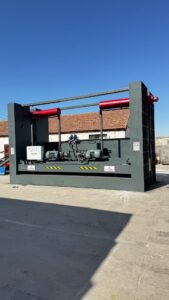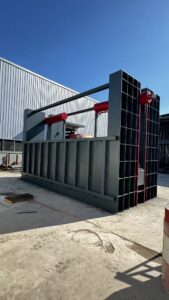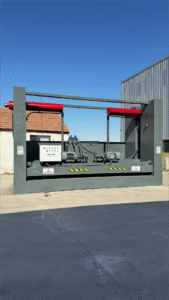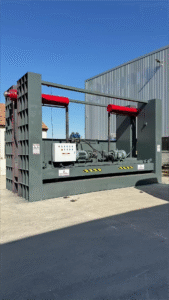In the modern era of sustainable development and resource recycling, car flattening machines, also known as car balers, play a crucial role in the automotive recycling industry. These powerful machines are specifically designed to compress end-of-life vehicles into compact, manageable shapes for easier storage, transport, and further processing. Whether you run a scrap yard, metal recycling facility, or vehicle dismantling operation, investing in a car flattening machine can significantly enhance your productivity, profitability, and environmental compliance.
In this article, we will explore what a car baler is, how it works, the benefits it brings, the main types available in the market, and how to choose the right machine for your business.
What Is a Car Flattening Machine?

A car flattening machine is a heavy-duty hydraulic press that compresses entire automobiles into flat sheets or compact blocks. These machines are typically used in auto salvage yards and metal recycling facilities to reduce the volume of scrap vehicles, making them easier to store, transport, and process in downstream shredders or smelters.
Car balers come in various models, including stationary, mobile, and portable types, and can handle different car sizes, from small sedans to SUVs and vans.
How Does a Car Baler Work?

Car balers use high-pressure hydraulic cylinders to compress the body of a vehicle from multiple sides—top, bottom, and sometimes from the sides—depending on the baler design. The working process generally includes the following steps:
-
Vehicle Placement: The end-of-life vehicle is loaded into the compression chamber, either manually by a crane or using a feeding system.
-
Hydraulic Compression: The hydraulic system activates and applies tremendous pressure (typically between 100 to 250 tons or more) to flatten the vehicle.
-
Ejection or Removal: Once compressed, the flattened car body is automatically or manually removed for stacking or transportation.
Some advanced machines also include shearing functions to cut vehicles into smaller pieces.
Key Benefits of Car Flattening Machines
1. Increased Efficiency
Flattened vehicles take up far less space than whole cars. A single operator can process dozens of cars per day, increasing the throughput of your facility and reducing labor costs.
2. Reduced Transportation Costs
By significantly reducing the size and volume of scrap cars, you can load more material per truck or container, saving you money on logistics.
3. Improved Safety and Cleanliness
Properly flattened cars eliminate sharp edges and bulky parts that may pose risks to workers. Some machines also allow oil, fuel, and other fluids to drain during the compression process.
4. Environmental Compliance
Modern car balers are designed with leak-proof oil tanks, hydraulic safety locks, and automatic fluid drainage systems, helping you meet environmental and safety regulations.
5. Higher Scrap Value
Compact and uniform scrap is easier to process in shredders and furnaces, often commanding higher prices from buyers due to ease of handling and quality.
Common Types of Car Baling Machines

1. Horizontal Car Baler
These machines compress vehicles from the sides and top, creating dense rectangular bales. They are suitable for large-volume operations and are often stationary.
-
Pros: High throughput, suitable for continuous operations
-
Cons: Requires large floor space
2. Portable Car Baler / Mobile Car Crusher
Mounted on a trailer or with crawler tracks, these machines can be easily transported to various scrap yards or accident sites.
-
Pros: Flexible, mobile, easy deployment
-
Cons: Lower capacity compared to stationary units
3. Lift Door Car Balers
Equipped with a vertical door that lifts up and down to load and compress vehicles. These are often more compact and suitable for small- to mid-sized scrapyards.
-
Pros: Space-saving, easy operation
-
Cons: May have size limitations
4. Car Baler with Shear Function
These machines combine flattening and cutting in one unit, allowing operators to shear large parts like frames, axles, or engines after compression.
-
Pros: Multifunctional, saves time and equipment costs
-
Cons: Higher initial investment
Key Specifications to Consider
When selecting a car baler, keep the following technical parameters in mind:
| Parameter | Importance |
|---|---|
| Pressing Force (Tons) | Determines how tightly the vehicle is compressed |
| Chamber Size | Indicates the maximum car size that can be processed |
| Bale Size | Affects storage and transport options |
| Cycle Time | Impacts operational speed |
| Mobility | Choose between stationary or mobile according to your workflow |
| Hydraulic System Power | Affects efficiency and compression strength |
| Machine Weight & Size | Impacts installation and transport logistics |
Who Needs a Car Flattening Machine?

Car balers are ideal for:
-
Auto recycling yards
-
Vehicle dismantling plants
-
Scrap metal processors
-
Municipal recycling centers
-
Logistics fleets and decommissioning departments
Why Choose Our Car Flattening Machine?
At AULTRAL, we offer a range of reliable, CE-certified, heavy-duty car balers tailored to the needs of modern scrap yards. Our machines feature:
✅ Robust welded steel construction
✅ High-efficiency hydraulic systems
✅ Easy-to-use control panels
✅ Optional remote control & auto feeding systems
✅ After-sales support & spare parts supply
Whether you need a compact unit or a high-capacity baler with mobility, we have the solution ready for your site.
Final Thoughts
The demand for environmentally responsible and cost-efficient vehicle recycling is only growing. Investing in a car flattening machine not only boosts your operational capabilities but also helps you meet modern sustainability standards.
If you’re ready to take your scrap processing to the next level, get in touch with us today. Our team will provide customized solutions based on your material type, daily output, and budget.
📩 Contact us now for a free consultation, machine video, and quotation!
